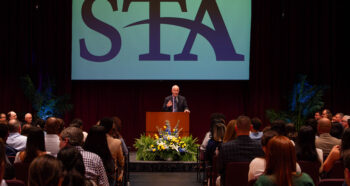By Nidhi Birla, Business Management Teacher, Global Indian International School, Smart Campus, Singapore
In this blog, we speak to a Cambridge school in Singapore about how essential both education and student involvement are to addressing the climate crisis.
Global Indian International School (GIIS) has 2860 students aged 3-18 years. At our Smart Campus in Punggol, we offer Cambridge Lower Secondary and Cambridge IGCSE subjects.
Our students relate well to learning about climate change. They know that the very survival of the human race and the planet is under threat, and they understand that if we continue with traditional methods that are not environmentally friendly, there will be dire consequences.
Learning about climate change through the Cambridge curriculum
Climate change education is integrated into different Cambridge subjects and studied in more detail in Cambridge Global Perspectives and Cambridge IGCSE Environmental Management.
One of our Cambridge Lower Secondary students, Aradhana Anand, explains how the Cambridge curriculum has improved her knowledge of climate change: “In Biology, I learnt about natural disasters caused by changes to the atmosphere and the health effects that can cause. In Physics I learnt about renewable and non-renewable resources and in Environmental Management, I learnt about resulting phenomena like acid rain.
“The Cambridge curriculum has inspired me to reflect on some of my habits and actions. Learning about how these habits and actions impact the planet has made me realise that small actions can lead to really huge effects.”
Cambridge Global Perspectives and the bigger picture
Specific topics in Cambridge Global Perspectives enable our students to dig deeper into climate change and its impacts. These topics include: water, food and agriculture, sustainable living, biodiversity and ecosystem loss, and fuel and energy.
As students move on to study Global Perspectives at Cambridge IGCSE level, they have a broader and deeper understanding of climate change . They research and consider Singapore’s fuel consumption and the country’s legislation to combat climate change, but they also develop the ability to look at issues from a global point of view.
In the case of atmospheric pollution, for example, students know it’s trans-boundary and can’t have a clearly defined geographic boundary. This has helped them understand the importance of a top-down approach and why international agreements like the Montreal Protocol, the Kyoto Protocol and the Paris Agreement have been implemented at global level and must be translated at a national level.
Cambridge IGCSE student Lad Shah says: “Global Perspectives is a crucial subject in today’s world. It deals with global issues, including climate change, scrutinising how they can be solved through various perspectives.
“It is students who will grow up to be global crisis handlers so it is vital that schools nurture future global leaders who will be involved in creating climate change solutions.”
Rewarding innovative thinking on climate change
This year in the Southeast Asia & Pacific region, Cambridge encouraged students to submit videos to show the world their climate change initiatives and inspire others to tackle one of the world’s most critical humanitarian crises. Four students from GIIS were recognised for their Green Threads project, which focused on recycling old school uniforms to manufacture furniture.
Team members Anaya Shabi, Anwita Sethi, Kiana Kamdar, and Kritika Tripathy explain the benefits: “We are thrilled and very grateful to have this platform to share our idea. This achievement motivates us to continue working towards our idea of converting old textile waste to chairs. We hope to continue working on the mission of Green Threads and that it creates an impact that will truly change the world for the better. We also hope that displaying our idea inspires our peers.”
Motivating students to take action
GIIS provides lots of ways to motivate students to take action on climate change and we were recently awarded the School Green Award from Singapore Environment Council for our green practices.
For example, our school assembly is interwoven around the themes of the UN Sustainable Development Goals, and students are challenged with presenting one of the 17 goals in an interesting manner to spread awareness about it.
We encourage students to reduce, reuse and recycle on campus, providing different bins and organising book collections and clothes recycling drives. Students are also encouraged to use pen refills rather than using a new pen.

The school has several corners on campus maintained by students where we have planted beautiful greenery.
Subjects like Cambridge Global Perspectives have encouraged students to take action, as Cambridge IGCSE student Naisha Raturi says: “Inspired by Global Perspectives, I’ve taken measures to minimise my carbon footprint. I have started unplugging electrical appliances to reduce energy consumption as well as adopting a vegetarian lifestyle.
“Moreover, the curriculum has empowered me to share my understanding, prompting me to actively educate friends about climate change and the significance of individual contributions.”
Find out more about Cambridge Global Perspectives for students aged 5 to 19
Find out more about Cambridge IGCSE Environmental Management
Climate change and the UN Sustainable Development Goals
Related Article





